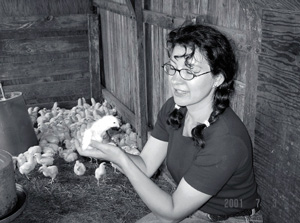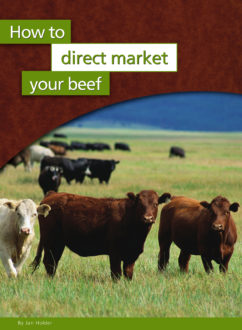
Since 1999, Wende Elliott has raised poultry and lamb in a pasture-based system on her 120-acre central Iowa farm. With her husband, Joe Rude, she gained organic certification for her meat products, as well as alfalfa, oats and corn.
As they fine-tuned their production, Wende and Joe pondered how to get the most from their meat. In 2001, Wende wrote a business plan and successfully launched a cooperative called Wholesome Harvest. With two grants from the Sustainable Agriculture Research and Education (SARE) program, she began to promote meat sales in five Midwestern states.
Wholesome Harvest is now a thriving, farmer-owned organic business with more than 40 members. The e-commerce site, wholesomeharvest.com, is a successful direct sales mechanism that augments more traditional markets such as grocery stores and restaurants.
The website provides a wealth of information about the Wholesome Harvest cooperative and the group’s efforts to promote organic meat grown on pasture with humane handling practices.
Wholesome Harvest’s virtual market enables buyers to order meat online for delivery. It evolved from Wende’s vision that people who wanted to eat certified organic, independently raised meat from family farms didn’t have to go farther than their computer to shop for it.
In an innovative twist on community agriculture projects, people can join Wholesome Harvest’s meat-of-the-month club and receive monthly shipments of organic beef, chicken, lamb, duck, goose and turkey, much like a CSA. Frozen meat on dry ice is shipped via two-day express delivery. In its advertising, the co-op emphasizes that its products are locally grown, farmer-owned, pasture-raised and rendered at custom processors to give them a human edge over the more anonymous industrial model.
“We can’t compete on cheap food,” Wende said, “but we can compete on quality and freshness and the fact that our product is local.”
Growth, the co-op’s communications officer says, is steady. For that and other reasons, Wende hopes to form a national coalition of regional organic meat cooperatives.
“Only by working together can farmers protect the added value of organic meat, and capture premium and remote as well as mainstream markets for their products,” Wende said. “Otherwise, they will end up being paid what the plant wants to pay them.”
To learn more about the national coalition, contact Wende at welliott@wholesomeharvest.com.
